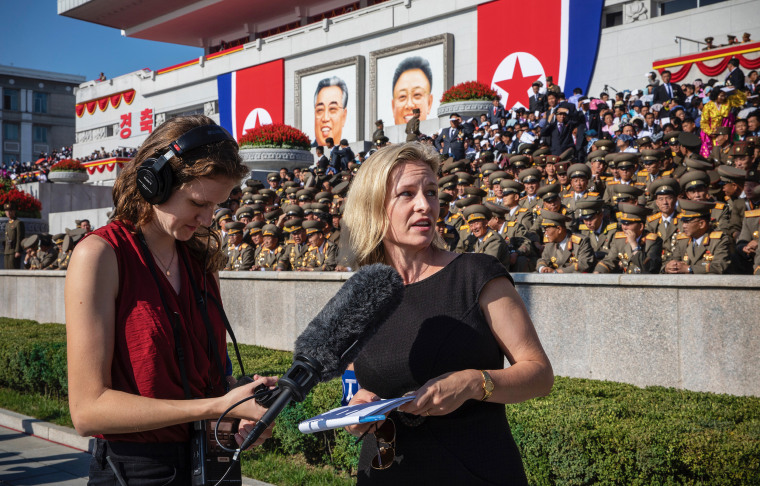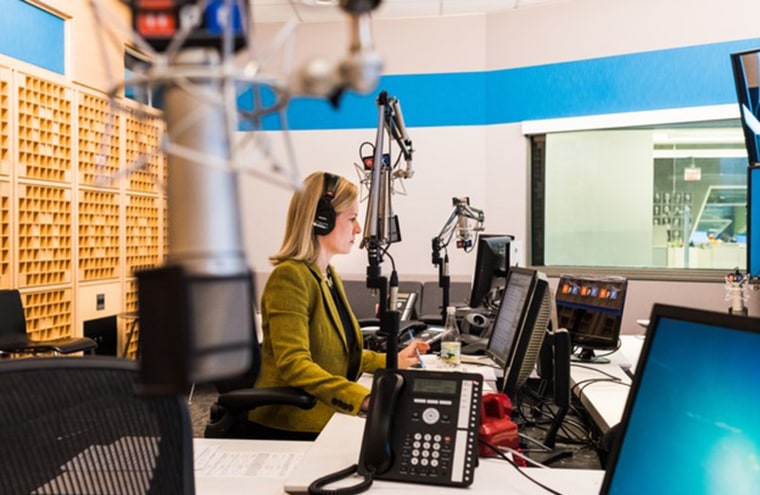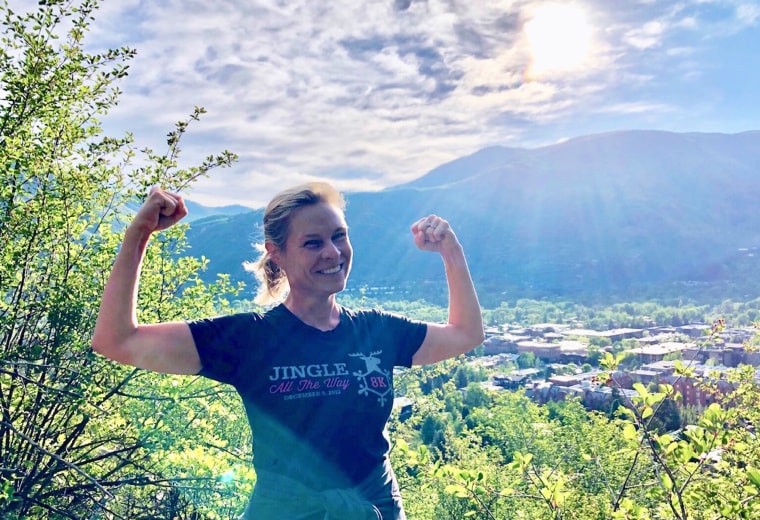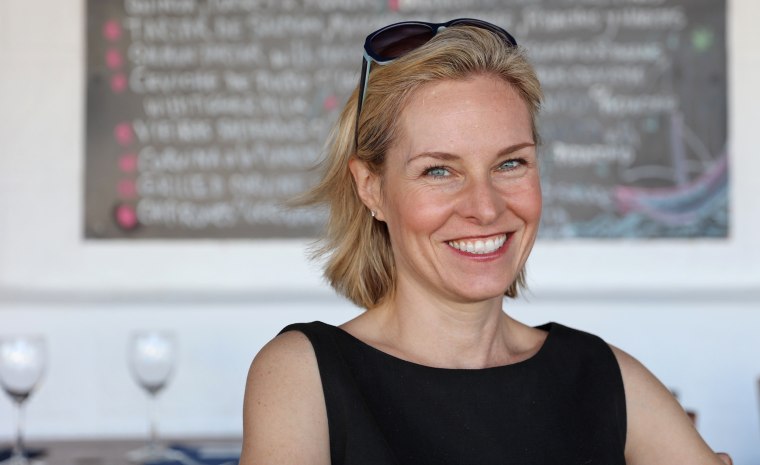NPR’s Mary Louise Kelly has one of the most recognizable voices on public radio. As co-host of “All Things Considered,” she delivers the headlines, interviews newsmakers and reports from all over the world.
It’s a job that’s all about sound and listening to what people say. So it may come as a surprise that Kelly does it all as a person with severe hearing loss — an issue that affects many older adults but emerged when she was only in her early 40s.
For a while, the journalist could fake that she was able to hear well. But the "breaking point" came during a 2014 book tour to promote her first novel when she found she couldn’t hear any questions from the audience, Kelly writes in her new book, “It. Goes. So. Fast.: The Year of No Do-Overs.”
“It was stark because it was undeniable,” Kelly, now 52, tells TODAY.com.
“I had kind of known this might be in my future because my father had severe hearing loss and his mother before him, so it runs in my family and I knew that. But I was just so young, and I think I’d always associated hearing loss and needing hearing aids with somebody who was old, and I didn’t feel old.”
Kelly is “deaf, or close to it,” she writes in her book. When she finally went to see an audiologist about a decade ago, a test revealed she missed 70% of what was said when she couldn’t read a person’s lips. She began wearing hearing aids soon after.
Kelly says the technology has been “life-changing” — especially the newest hearing aids with Bluetooth that pipe phone calls directly into her ears — allowing her to work and carry on living her life as normal. But hearing loss comes with a stigma that doesn’t apply to, say, vision problems, she has noticed.
Kelly shares her experience in an interview with TODAY.com:
What were your earliest indications something was wrong with your hearing?
I noticed everyone seemed to mumble all the time, and I started watching TV with the subtitles on more and more.
I have hearing loss in both ears, and it is severe to profound at higher frequencies, so it’s harder for me to hear women than men.
I also have largely lost the ability to distinguish between certain consonants. For example, did you just offer me a cub of coffee or a cut of coffee? It’s only through context that I know you’re probably offering me a cup of coffee. I am constantly playing catch up trying to figure out the context — what people are likely saying based on what the sentence before was.
I delayed getting hearing aids partly because I was in denial. The consequence is I had stopped engaging in certain situations. You check out because it’s so damn hard at a loud cocktail party to track a conversation and follow it. I found it easier just to stay home than ask people for the 17th time, “Can you speak up? Can you repeat that?” It gets exhausting.

Did you worry about the impact on your job?
Yes, because hearing loss presents some very special challenges in my job. I’m the one asking questions and then listening to the answers, and I need to hear what you’re telling me so that I can follow up.
It has gotten better because the technology keeps getting better. The leap to hearing aids with Bluetooth has been totally life-changing.
The studio is actually a dream work environment because it’s professionally soundproof. What drives people with hearing loss crazy is the crowded restaurant or the bar where there’s all kinds of background noise. If you’re cranking your hearing aid to try to hear the person in front of you, you’re making everything else louder, too, until it feels like your head is going to explode.
But in the studio, there is no other noise, and you’re coming to me through professional top-of-the-line headphones. I can turn them up and it’s a dream. I have to do some things differently than some of my co-anchors, but so far we’ve been able to make accommodations and carry on. I can do my job fine.

Did you have any reservations about people seeing your hearing aids?
I was a little self-conscious at first. It’s not like wearing glasses. Everyone I know my age is constantly pushing reading glasses on or off their nose, and it’s just par for the course. But with hearing aids, there is a stigma. A lot of people who should be wearing them probably aren’t.
But pretty quickly, I just was so grateful. Suddenly, I could function in ways that I hadn’t. I was so angry at myself that I hadn’t done something about it sooner.
We’ve all got stuff going on. Everybody’s got their challenge. This is mine and it’s not that bad.
There just shouldn’t be any stigma. And now that everybody walks around with earbuds in all the time anyway, that’s basically just how I’ve come to think of it. I walk around with these things in and that’s how I hear my phone and my music and how I talk to people. It’s just not that big a deal.
What difference did hearing aids make in your life?
I will never forget walking out of the audiologist’s office wearing hearing aids and stopping in my tracks because there was this weird noise. I realized, oh, that’s my footsteps. I hadn’t heard that in years.
I’m a runner and I was used to jumping in fright when people on bikes whizzed past me because I could never hear them coming. The first time I went for a run in hearing aids, I’m like, oh, that’s somebody on a bike coming up behind me, I can scoot over.
The biggest moment for me was driving carpool with my kids, who were still pretty small then. They were in the back seat and giggling over something. I realized they’ve been doing this for years and I missed it. I was grateful that I could now hear it, but felt a punch to the gut that I missed so much.

What’s your advice for people who are struggling with their hearing?
It only takes an hour to go and get an audiologist work up. It's generally covered by health plans and then you know what you’re dealing with. You may not realize how much you’re missing or compensating in other ways.
Hearing aids get better every year. There are different settings — one for loud restaurants, one for quiet rooms, one if you’re trying to hear action that’s coming at you from a movie screen or a stage.
When you do get them, there’s a transitional process where your brain is learning how it’s going to work with this new input. I remember being overwhelmed when walking into a Starbucks where they had the bean grinders and the steam machines. It is so loud. The temptation is just to quit and retreat again. Be patient. Give yourself time.
It’s totally normal to go back and get little adjustments for the first few weeks. Bear with it and understand it’s never going to be perfect. I still have to watch TV with the subtitles on. I still am way more comfortable if I can see your lips move.
But it’s so beautiful to lie in bed and hear a bird singing outside or to hear your kids talking or to be able to follow along with the lyrics to a song. It really is life changing.
This interview was edited and condensed for clarity.

